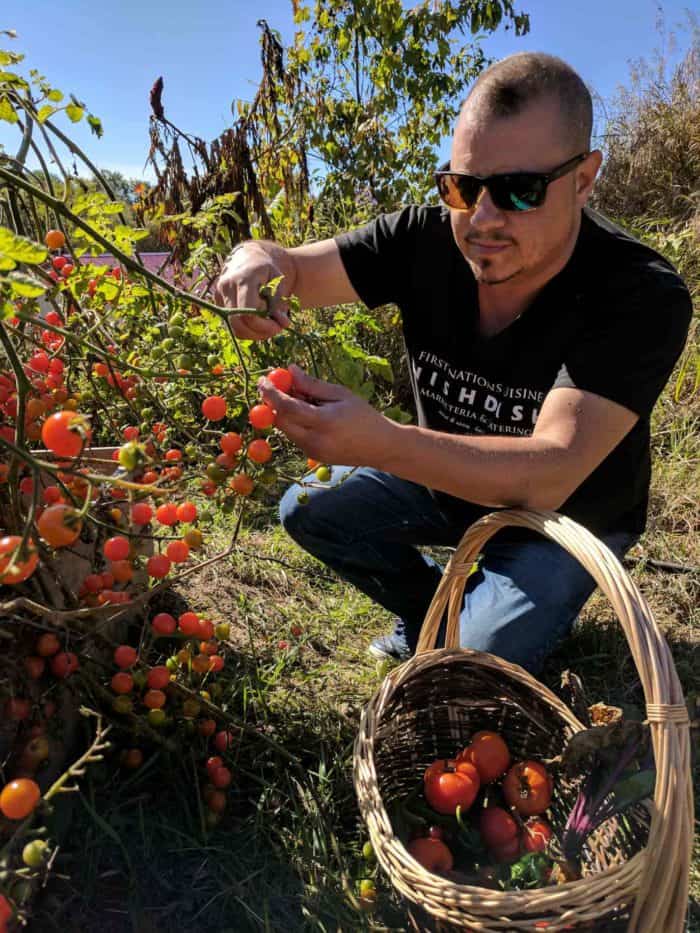Chef and local food advocate Johl Whiteduck Ringuette of NishDish is on a journey to help reshape the landscape near his Bloor West restaurant and catering company. A process, 13 years in the making, to bring back and celebrate the traditional Anishinaabe diet, has pushed Johl to the forefront of much more than a surge in the Indigenous food scene. It has opened the door to important conversations surrounding food sovereignty, youth employment and education opportunities, and his current focus on the eventual creation of an Anishnaabe District in Toronto’s Christie Pitt’s neighbourhood.
Johl, grew up North of North Bay. His grandmother is a member of Nippissing First Nations in North Bay. Raised by his mother along with five siblings, his parents were extremely hard workers but money was scarce, so they were very resourceful in having to feed such a large family. His parents hunted wild game and picked berries every year in the berry season. The family fished and trapped.

Upon moving to Toronto in 1988, Johl searched for the Indigenous community and after many years discovered Anishnaabe Health where he met traditional teacher Wanda Whitebird who connected him with his first medicine teacher Mark Thompson. Mark Thompson helped him find his gift and the purpose of his life’s journey. Under Mark’s guidance and through ceremony Johl found out that he was from the mink clan, making him a bringer of things to his community. Mark asked Johl to bring back the traditional diet to help heal the circle, which has been broken. Broken through the residential school legacy, systemic destruction of language and culture, and laws, which outlawed conversations and dialogue between First Nations people and their way of life.
Johl spent those first years learning the ins and outs of running a business. Always learning, he focused on reading, researching, and having conversations with elders to help uncover stories of his ancestral past. He continued his work with the Aboriginal Legal Service of Toronto focusing on the Gladue principle and helping his people navigate the cumbersome court system. The Gladue principle allows the court to take into account all reasonable alternatives to incarceration. It requires the court to take into consideration the historical barriers facing Aboriginal offenders.
This important work has allowed Johl to lobby at both the municipal and provincial levels for a more clear designation of rights in the justice system, which often treats Aboriginal offenders very harshly. His input helped create a number of important legal precedents. In his journey to establish a more central focused native district, he founded a grassroots collective called RUN – Red Urban Nation, to put Indigenous rights and business development at the heart of the GTA. . Throughout this period his catering company, NishDish continued to grow. Johl brought a renewed sense of cultural identity to help his community heal and thrive.
An accident, that involved a TTC bus striking Johl on his bicycle in Toronto in September of 2013, put Johl’s plans for progress in peril. His journey back to health has been a long one that is still ongoing. Using traditional medicine, the help of healers, and a strong community of support he has slowly been finding his feet. The financial toll and physical burden of his medical emergency continue to linger, but Johl has moved forward on many fronts with the help and support of his family, friends and community members.
He opened the doors to NishDish on Bloor Street West in April of 2017 to a fanfare, which Eli Glasner so eloquently documents in his CBC article on Indigenous cuisine. The restaurant and catering business have continued to flourish with dishes like the three sisters stew, elk stew, wild rice casserole, bison chipotle sausage, keeping customers coming back for more. There is often a line-up for brunch on the weekends and a warm cup of sweet grass tea and fresh baked cornbread await hungry mouths.
Johl’s focus on food sovereignty and eating in tune with the seasons has allowed him to reconnect with his past. For the three sisters stew he sources traditional Mohawk white corn, from Hill’s White Corn in Six Nations of the Grand River just West of Toronto. He is still searching for ways to get enough wild rice from local producers and is also experimenting with harvesting more of the traditional foods like cattails, sunchokes, sumach, cedar, acorns, and goosefoot with the hope that this can help increase food security across the Greater Toronto Area.

He has a number of different projects on the go including a culinary program which teaches youth how to cook, plant and harvest traditional crops, and run their own small business. From this program he founded a new not-for-profit that specializes in Indigenous Food Sovereignty and Indigenous agro-ecology and preservation of language and culture. Ojibiikaan Indigenous Cultural Network is currently working on a “Little Roots” land-based early years program to help nourish and connect Indigenous communities with their land, food, culture, and language. These tools to empower and employ youth are putting down strong root systems to grow future leaders. Johl also simultaneously co-founded the Toronto Indigenous Business Association, TIBA, a grassroots movement of entrepreneurs that operates under its Indigenous clan system. TIBA is working to create a business and community district in Toronto for the many Indigenous nations living in the city. The early foundations are well in place with NishDish on Bloor West, a medicine garden in Christie Pitts, with eventual plans for a cultural centre, housing, and Indigenous Library, Indigenous language school, Indigenous culinary arts school and much, much more.
Johl continues to work tirelessly on a large number of fronts. His goal to create a thriving Indigenous hub in the area around NishDish is an important step in the healing process. He continues to bring so many gifts to his people and is using food as a tool to help showcase traditional practices to a captive audience. There are many important lessons to be learned from the First Nations, Metis and Inuit people in terms of regenerative land practices, more co-operative business models, and the wisdom of older generations, with a mandate to preserve the land for at least the next seven generations to come.
Please stop by and try a meal at Nish Dish. Talk to Chef Johl, learn about Ojibiikaan, TIBA, and the incredible work that these Indigenous leaders are doing in the community.
Thank you, Miigwech



